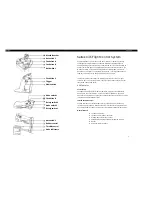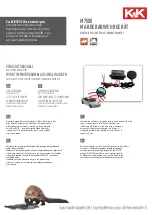
6K V2.0 12-14-01
185
Run-Time Variables
Run-Time Variables
(RTVs) are small code groups that you place into a
message to be expanded at
“run time” (the instant the message is actually
transmitted by the controller). The message handler recognizes run-time
variables because they always begin with 98.
When the message handler encounters an RTV, it forms the appropriate
message and transmits it in place of the RTV code. You could, for example,
announce the time or date as part of an ID, autopatch termination, or other
occasion. You may precede and/or follow the RTV with other messages,
routing codes, and so on. RTVs may be placed in succession to form a single
expression.
Run-Time Variables
Run-Time Variable
Meaning
Example
9810
hour & minute, 12-hr format, CW
2 45
9811
AM/PM, CW
PM
9812
hour & minute, 24-hr format, CW
14 45
9813
day of week, CW
WED
9814
month, CW
JAN
9815
day of Month, CW
1
A feature of the clock and calendar RTVs is that the current time and date are
read and stored at the first RTV encountered in a message. If the time or date
“rolls over” during the message transmission, it will not affect the time or date
being sent.The real-time clock and calendar features leap-year correction.
Here are some ideas: To send the time and AM or PM, enter
(PW) 15 9810 9811 *
You would hear
“two forty-five PM” or something similar.
You can create similar commands to send
“today is ( ),” “the date is ( ),” and so
on.
Note:
It is not necessary to place the control code 9900 in front of CW run-time
variables. The RTV automatically inserts the control codes into the message.
However, you must enter control codes
after
the RTV if you have a different
type of message to follow.







































